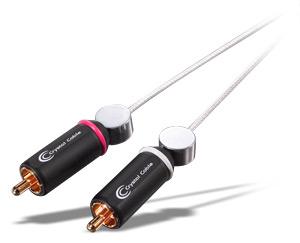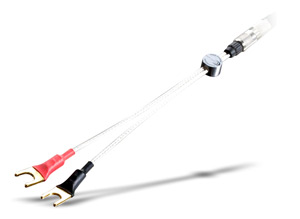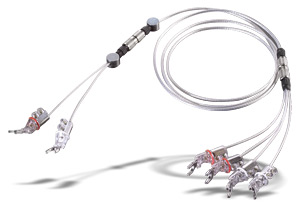 |
|
| May 15, 2006 Crystal Cable Reference Interconnects and Speaker Cables
Fatties take note I once ran a pair of Crown Macro Reference power amps bridged to mono. For ideal low-end performance, Crown stipulates speaker-cable heft. Depending on length, Crown’s recommended wire gauges range from the thick to the irrational -- for a long run, visualize those hemp hawsers used to secure large ships to their berths. Now contemplate a speaker cable as brawny as a single strand of medium spaghetti. Cooked. You’ve just visualized the Crystal Cable Reference. Yes, for Crystal Cable BV, of the Netherlands, thin is in and it’s svelte to the max. I requested and received for review one pair each of Reference speaker cable ($4299 USD/2m pair) and balanced interconnects ($1950/meter pair). I share my thoughts with Readymade, a kitten Best Beloved brought in from the snow "Ha! We’ll soon put an end to this anorexic nonsense!" I had decided to investigate the Reference speaker cables’ low-end capabilities long before Crystal Cable’s suggested maturation period of 100 hours had elapsed. Readymade feigned indifference. With Crystal Reference ICs and speaker cables installed and with malice aforethought, I played a few CDs with gobs of deep bass, among them a 1985 release produced and engineered by the inestimable John Eargle. Great Organ Works features Robert Noehren performing compositions by J.S. Bach on the Rieger organ of the Pacific Union College Church in Angwin, California [Delos D/CD 2038]. The program opens with the oft-recorded Toccata and Fugue in D Minor, which I played at a volume setting referred to by apartment-dwelling audiophiles as a lease breaker. As the organ’s long pipes rattled the bric-a-brac, Readymade, who seems to prefer viol consorts, quickly departed couch and room. Amazing! My Wilson Audio WATT/Puppy 7 loudspeakers had never before reproduced this disc’s low end more cleanly or authoritatively. Did the alarmingly skinny Crystal Reference speaker cables skimp on bass? Absolutely not, nor were they tubby. So from the start, and in all respects, I was liking what I heard. The rest of my system, for your reference, included the NuForce Reference 9 SE amplifiers and the Aurum Acoustics Integris CDP CD player-preamp. Pins and cable aesthetics Crystal’s bass-friendly Reference speaker cable features a clever novelty. At either end, identical German-made connectors permit termination changes -- spades to bananas, say, or an added length of cable. I unscrewed one pairing to examine the linkage. Four diminutive pins on the cable side connect to the adapter’s likewise diminutive receptacle. In reattaching the two sides, I was pretty sure I had the alignment right, but still . . . A comforting e-mail from Crystal’s president and CEO, Ms. Gabi van der Kley, alerted me to a tiny nub on the four-pin side that slips into the adapter’s groove. No worries -- if you misalign pins and holes, the halves won’t close. Considerations of infallibility aside, the forked adapters and their connectors actually make for attractive speaker-cable terminations. In keeping with Crystal’s Design Philosophy of Thin, the clear dielectric is of minimal thickness. According to Crystal’s website (which I urge you to visit), the conductors within are impregnated with gold where vacancies occur among the silver crystals. Why we spend the big bucks There are still some skeptics out there who regard component burn-in, or break-in, or maturation, as yet another geeky fantasy. May they prosper in their obduracy. Like most experienced audiophiles, I accept burn-in as a supplementary price of admission, so when I install new cables, I’m prepared for less than stellar sound. I’ve often heard fresh-out-of-the-box cables sound dull -- more often than not, thick and congested. But if the cable has been well designed and manufactured, transparency, resolution, and dynamic finesse appear in due course. However, the Crystal Reference interconnects and speaker cables sounded good straightaway, exemplary soon thereafter, and after the first dozen hours’ play I could hear little further improvement. That’s a virtue, folks (on the cables’ part, I mean). During my listening sessions, "delicacy with authority" seemed an apt characterization of the Crystal References. Like all good audio equipment, they made their presence felt by keeping out of the way. I know -- the comment is illogical and I’m on thin ice. I do understand that: 1) not all audiophiles eschew coloration, and 2) nothing in one’s sound system can be absolutely uncolored. Thus acknowledged, neutrality dwells withal at the bull’s-eye’s core. From what I heard -- or didn’t hear -- this also seems Crystal’s goal. Comfort defers to astonishment I soldiered on, thinking, Yes, yes, very nice. I couldn’t fault the Crystals’ presentation. "Delicacy with authority" held its ground, but I’d already grown so acclimated to these cables -- or, better, to their inaudibility -- that I’d begun attending to their extraordinary transparency and dynamic finesse less than critically. Then, one afternoon, I put on a disc I’d not played for weeks. Dieter Ammann is a living Swiss composer of the modernist persuasion, in salutary contrast to present-day classical’s post- and neo-Romantics, may they simmer till fork-tender in their saccharine accessibility. Ammann’s The Freedom of Speech, hat[now]ART 158, begins with a work in which a solo cello carries on a dialogue with a dazzling orchestral array. "Violation I" calls for a soul-satisfying ffff onslaught that has always sounded wonderful. Through the Crystal References, this moment was on a higher plane. The loud passage was, as usual, huge, but never had I heard it in such remarkably dimensional, meticulous detail. My listening room, in its entirety, had become the soundstage. Wow. And wow again. Together, the Crystal Reference ICs and speaker cables transmitted my Integris CDP’s extraordinary resolution to perfection. I don’t think that’s an overstatement. Not all audiophiles seek the same ideal. A respected cable designer once assured me that he could tailor his line to compensate for shortcomings in customers’ audio systems. I was appalled. Let’s say you love tubed gear. (I don’t, but what the hell.) As I see it, unless something in your system sounds downright nasty, these beautifully neutral and transparent cables cannot possibly inflict harm. If your glowing tubes provide those midrange comforts you adore -- i.e., so much liquidity you almost need a mop -- an audio cable should pass along these treasured features unadorned and unencumbered. You might say that any audio component is either a messenger or an interpreter. Crystal is definitely in the messenger category. Think of that god with wings on his feet. My reference cables Because the audio memory is fragile, A/B comparisons are best done speedily. But replacing one set of cables with another takes time, and the Cardas Golden Reference cables (interconnect, $917/meter pair; speaker cable, $2106/8’ pair) I’d been using impose a further difficulty: If handled however long after their initial burn-in, they need about an hour of play to return to top form. Still, a step-by-step comparison -- ICs first, speaker
cables next -- confirmed my impressions of the Crystals. Remaining with that aurally
scrumptious Dieter Ammann disc, and with the understanding that two good cables will sound
more similar than different, the Cardases exhibited a touch more midrange prominence and
warmth than the Crystal References. Conversely, in listening carefully to that ear-popping
moment in the Ammann, Further attentive listening with a number of CDs -- jazz, chamber music, vocal, orchestral -- reinforced the perception of exemplary resolution and harmonic detail. In my system, the Crystals performed an ideal balancing act. Even if some hidebound audiophile should glance at my speakers’ backsides and opine that such insubstantial wires could not possibly produce convincing bass, I would offer no word of caution or criticism, but direct said guest to the sweet spot and . . . In conclusion My heartiest recommendation for the Crystal Cable Reference interconnects and speaker cables. They really are something. …Mike Silverton Crystal Cable Reference Interconnects and Speaker
Cables Crystal Cable BV E-mail: info@crystalcable.com US distributor: E-mail: joe@crystalcable-usa.com
Ultra Audio is part of the SoundStage! Network. |



 I judged the Crystals the better
resolvers, particularly in the upper midrange and treble, while sacrificing none of that
critically important midrange verisimilitude. Their exquisitely delineated image simply
sounded more convincingly dimensioned. There was nothing the least bit
"clinical" or "analytical" about the Crystal References.
I judged the Crystals the better
resolvers, particularly in the upper midrange and treble, while sacrificing none of that
critically important midrange verisimilitude. Their exquisitely delineated image simply
sounded more convincingly dimensioned. There was nothing the least bit
"clinical" or "analytical" about the Crystal References.